| Summary: The
Moon glided in front of the Sun on April 8th producing a partial eclipse
across the Americas and a total eclipse in the Pacific Ocean. [full
story]
Page
1 | This is Page 2 | Page 3
| Page 4
Unless otherwise stated, all images are copyrighted by the photographers.
| |
Photographer, Location,
Date |
Larger images |
Comments |
|
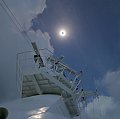

|
Dennis Mammana,
Path of Totality, South Pacific Ocean, 128
W Longitude, 21 S Latitude
Apr. 08 |
#1,
#2, #3,
#4,
#5, more |
It was around noon
local time that the moon's shadow overtook the M/S Paul Gauguin
in the South Pacific Ocean, where 266 total solar eclipse chasers
were waiting with great anticipation. And, because of the expert
navigation of Captain Gilles Bossard, the sun popped out from
behind a huge cumulus cloud only seconds before totality; such
dramatic timing would have been envied by any great Hollywood
director! Location: Approximately 128 W Longitude, 21 S Latitude
|
|

|
Craig Prater,
From the rolling deck of the cruise ship MV Discovery at 129 deg 38.7' W and 22 deg 37.2 S in the South Pacific.
Apr. 08 |
#1 |
These images were taken 1 second apart using a Canon Digital Rebel at ~200 mm focal length on a fixed tripod. The rocking motion of the ship caused the center of the image to bob up and down from exposure to exposure. So you can really appreciate any high mag telescopic images taken under these conditions!
|
|

|
Marko A.J. Espinoza Cangahuala,
Eagle Beach, Aruba
Apr. 08 |
#1,
more |
These pictures where taken with a Canon Photoshot S400 camera and a with Sony Handycam DCRPC-350 videos are available on www.sciencearuba.com
|
|
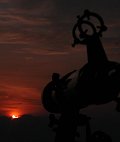
|
Gerardo Sanchez,
Macigual, Merida, Venezuela
Apr. 08 |
#1,
#2, #3,
#4, more |
Views from annular eclipse in Venezuela's village of Macigual in western state of Merida, 730 km from Caracas, April 8, 2005.
Using a Nikon Coolpix 5000.
|
|


|
Evan Zucker,
San Ysidro, California, USA. 32-32.7N, 117-4.1W
Apr. 08 |
#1,
#2, #3,
#4, more |
We observed the eclipse about 1/4 mile north of the Mexico-USA border, which I calculated was the furthest north any portion of the partial eclipse could be seen on the Pacific Coast. Magnitude was approximately 0.23%, obscuration approximately 0.013%. The edge of the lunar disc was clearly visible to me and my 7-year-old son Alex through my Coronado PST H-alpha telescope.
|
|
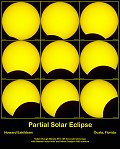
|
Howard Eskildsen,
Ocala, Florida
Apr. 08 |
#1 |
Eclipse series from April 8, 2005, Universal times on photos
Meade ETX-125, Baader Solar Film,
MaxView 40mm eyepiece, w-15 yellow filter
Nikon Coolpix Camera
|
|
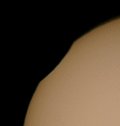
|
Dusty Wilson,
Baltimore, Ohio USA
Apr. 08 |
#1 |
I was at the Northern edge of the partial Solar eclipse. Picture was taken with a Canon Digital Rebel 300D,Orion solar filter and telescope.The moon barely took a bite out of the sun.
|
|
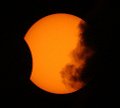
|
Charles Tilley,
Statesville, North Carolina
Apr. 08 |
#1 |
With thunder storms all around, sunshine finally poked through a few holes for just enough time to grab a few shots,
This photo taken at 6:15 PM with Nikon D70 digital camera; 300 mm lens shot through white solar light filter. 1/250 sec at f6.
|
|

|
Juan Jeronimo Reyna Ortiz,
desde Ciudad Ixtepec, Oaxaca, México
Apr. 08 |
#1 |
Las fotos fueron tomadas con una cámara digital Sony CyberShot DSP-92 con ayuda de un filtro casero y zoom 12x, en opción de automático.
|
|
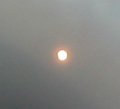
|
Mike Holloway,
van Buren, AR
Apr. 08 |
#1,
more |
Only had an older 2mp digital camera. I needed to image this event so I took some old paper sun viewers and manually held this in front of the camera lense. Not an award winner, but it did record for my records
|
|
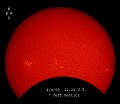
|
Jeff Pettitt,
Orlando, Fl. USA
Apr. 08 |
#1 |
We saw about 37% coverage at the maximum point using a Daystar H-Alpha filter and 4' refractor around 6:20 local time in Florida. There were clouds passing but fortunatly it was clear at max. coverage time.
|
More: from Cathy Schultz
of Ft Lauderdale, Florida; from Friedrich
Deters of LaGrange, North Carolina; from
Mike Harden of Lehigh Acres, Florida;
|














